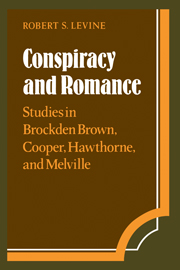3 - “A Confusion of Popish and Protestant Emblems”
Insiders and Outsiders in Nathaniel Hawthorne's The Blithedale Romance
Published online by Cambridge University Press: 05 June 2012
Summary
Catholicism wrests from the people the right to choose their own ministers, and the right of election is the very essence of our institutions. It establishes an aristocratical priesthood, and the whole people are steeped in republicanism. It withholds the Scriptures, and the age is a reading one, and reads the more what is forbidden.
W. E. Channing, Letter on Catholicism“Avoid the convent, my dear friend, as you would shun the death of the soul!”
(Kenyon to Donatello)“I was a prisoner in the Convent of the Sacré Coeur, in the Trinità de' Monti … but in such kindly custody of pious maidens, and watched over by such a dear old priest, that – had it not been for one or two disturbing recollections, and also because I am a daughter of the Puritans – I would willingly have dwelt there forever.”
(Hilda to “Hawthorne”) Hawthorne, The Marble FaunGalvanized by the republican revolutionary ferment of the early 1830s, Cooper in The Bravo sought patriotically to represent the depraved oligarchy of “republican” Venice as viewed through American eyes. But when he next wrote about Italy in Gleanings in Europe: Italy (1838), the country that once seemed to him politically corrupt now was worthy of his highest regard, given the depressing New York political and literary scene. In The Bravo Cooper called attention to a despotism that ensured sound order through a refined use of military and police force to create an omnipresent paranoia.
- Type
- Chapter
- Information
- Conspiracy and RomanceStudies in Brockden Brown, Cooper, Hawthorne, and Melville, pp. 104 - 164Publisher: Cambridge University PressPrint publication year: 1989



